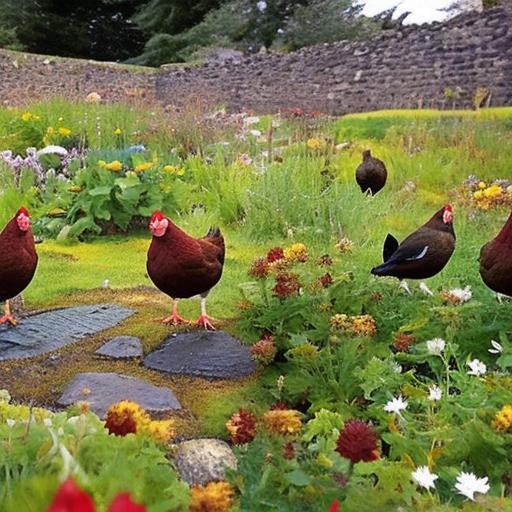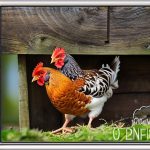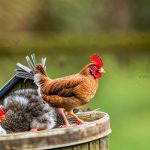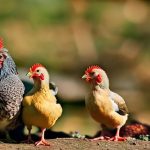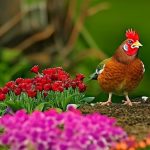Keeping chickens in your garden can be a rewarding and fulfilling experience. However, it is important to understand and follow the rules and regulations set by the Scottish government to ensure the safety and well-being of your chickens. These rules are in place to protect both the chickens and the surrounding environment.
In Scotland, there are specific guidelines that must be followed when keeping chickens. These guidelines cover various aspects such as the number of chickens allowed, the size and construction of the coop, and the management of waste. It is important to familiarize yourself with these rules before starting your own backyard flock.
By following these rules, you can ensure that your chickens are kept in a safe and healthy environment. This will not only benefit the well-being of your chickens but also contribute to a cleaner and more sustainable environment.
Key Takeaways
- Understanding the rules and regulations for keeping chickens in Scotland is important to avoid legal issues.
- Keeping chickens in your garden in Scotland can provide benefits such as fresh eggs and natural pest control.
- Choosing the right breed of chicken for your garden in Scotland depends on factors such as climate and egg production.
- Building a suitable coop and run for your chickens in Scotland is crucial for their safety and comfort.
- Feeding your chickens in Scotland requires a balanced diet and appropriate portion sizes to maintain their health.
Benefits of keeping chickens in your garden in Scotland
There are numerous benefits to keeping chickens in your garden in Scotland. One of the main benefits is the health benefits of consuming fresh eggs. Fresh eggs from backyard chickens are known to be more nutritious than store-bought eggs. They are higher in omega-3 fatty acids, vitamin E, and beta-carotene. By consuming fresh eggs, you can improve your overall health and well-being.
Keeping chickens for eggs can also be cost-effective. Once you have set up your coop and run, the cost of maintaining chickens is relatively low compared to buying eggs from the store. You can save money on groceries while enjoying fresh and delicious eggs every day.
Keeping chickens in your garden can also be educational for children. It teaches them about responsibility, compassion, and where their food comes from. Children can learn about the life cycle of chickens, how to care for them, and the importance of sustainable food production.
Another benefit of keeping chickens is the positive impact on the environment. By having your own backyard flock, you can reduce food waste by feeding them kitchen scraps and leftovers. Chickens are also great at reducing your carbon footprint as they produce less waste compared to other livestock animals.
Choosing the right breed of chicken for your garden in Scotland
When choosing a breed of chicken for your garden in Scotland, there are several factors to consider. The first factor is the climate. Scotland has a cool and wet climate, so it is important to choose a breed that is hardy and can withstand these conditions.
The second factor to consider is the space available in your garden. Some breeds require more space than others, so it is important to choose a breed that is suitable for the size of your garden. If you have limited space, you may want to consider smaller breeds or bantams.
The temperament of the breed is also an important consideration. Some breeds are more docile and friendly, while others can be more aggressive or flighty. It is important to choose a breed that suits your lifestyle and preferences.
Lastly, the egg-laying capacity of the breed should be considered. If you are primarily keeping chickens for eggs, you may want to choose a breed that is known for its high egg production.
Some popular breeds for Scottish gardens include the Rhode Island Red, Sussex, and Leghorn. These breeds are known for their hardiness, good egg production, and friendly temperament.
Building a suitable coop and run for your chickens in Scotland
Building a suitable coop and run for your chickens is essential for their safety and well-being. The coop should provide a secure and comfortable environment for the chickens to roost and lay eggs, while the run should provide them with space to exercise and forage.
When building or buying a coop, it is important to ensure that it is secure from predators such as foxes and rats. The coop should have strong fencing and a predator-proof design to prevent any unwanted visitors from entering. It should also have proper ventilation to prevent respiratory issues and insulation to keep the chickens warm during the colder months.
The run should be spacious enough for the chickens to move around and forage. It should also have a secure roof to protect them from aerial predators such as birds of prey. Providing perches and nesting boxes in the coop will give the chickens a comfortable place to rest and lay eggs.
Considerations for the Scottish weather should also be taken into account when building a coop and run. The coop should be well-insulated to keep the chickens warm during the winter months, and it should have proper ventilation to prevent overheating in the summer.
Feeding your chickens in Scotland: What to feed and how much
Feeding your chickens a balanced diet is essential for their health and well-being. Chickens require a diet that is high in protein, vitamins, and minerals. There are different types of feed available for chickens, including commercial feeds and homemade feeds.
Commercial feeds are formulated to meet the nutritional requirements of chickens at different stages of life. They are convenient and easy to use, as they come in pellet or crumble form. Commercial feeds can be purchased from local feed stores or online.
Homemade feeds can also be provided to chickens, but it is important to ensure that they are nutritionally balanced. Homemade feeds can include a mixture of grains, seeds, vegetables, fruits, and protein sources such as mealworms or fish meal. It is important to consult with a poultry nutritionist or veterinarian to ensure that the homemade feed provides all the necessary nutrients.
The amount of feed to provide to your chickens depends on their age and breed. Young chicks require a higher protein content in their diet compared to adult chickens. As they grow older, their protein requirements decrease. It is important to follow the feeding guidelines provided by the feed manufacturer or consult with a poultry nutritionist for specific recommendations.
Health and welfare of chickens in Scotland: Tips for keeping your birds healthy

Keeping your chickens healthy is essential for their well-being and productivity. There are several common health issues that can affect chickens in Scotland, including mites and respiratory infections.
Mites are a common problem in chicken coops and can cause discomfort and stress to the chickens. Regular cleaning and disinfection of the coop can help prevent mite infestations. Dusting the chickens with diatomaceous earth or using natural remedies such as neem oil can also help control mites.
Respiratory infections can be caused by poor ventilation or overcrowding in the coop. It is important to provide proper ventilation and ensure that the coop is clean and dry. Regular check-ups by a veterinarian can help detect any health issues early on and prevent them from spreading to the rest of the flock.
Preventing health issues is always better than treating them. Providing a clean and comfortable environment, a balanced diet, and regular exercise can help keep your chickens healthy and happy.
Managing waste and hygiene when keeping chickens in your garden in Scotland
Proper waste management and hygiene are important when keeping chickens to prevent the spread of disease. Chicken waste can contain harmful bacteria such as Salmonella, so it is important to manage it properly.
One way to manage chicken waste is through composting. Chicken manure is high in nitrogen and makes an excellent addition to compost piles. However, it is important to compost the manure properly to ensure that any harmful bacteria are killed off during the composting process.
Regular cleaning of the coop is also important to maintain good hygiene. The coop should be cleaned regularly to remove any droppings or soiled bedding. It is important to wear gloves and a mask when cleaning the coop to protect yourself from any potential pathogens.
Hand-washing is also essential after handling chickens or their waste. It is important to wash your hands thoroughly with soap and water to prevent the spread of any bacteria or parasites.
Biosecurity measures should also be implemented to prevent the introduction of diseases to your flock. This includes limiting access to your chickens, disinfecting equipment and footwear, and quarantining new birds before introducing them to the rest of the flock.
Dealing with predators and pests in Scotland: Protecting your chickens from harm
Predators and pests can pose a threat to your chickens in Scotland. Common predators include foxes, rats, and birds of prey. It is important to take measures to protect your chickens from harm.
One of the most effective ways to protect your chickens from predators is through secure fencing. The fencing should be buried at least 12 inches deep to prevent predators from digging under it. It should also be tall enough to prevent predators from jumping over it.
The coop should also be predator-proof. This includes using strong materials such as wire mesh or hardware cloth for the walls and roof. The doors and windows should have secure latches to prevent predators from gaining access.
Pest control is also important to prevent infestations of mites or other parasites. Regular cleaning and disinfection of the coop can help prevent pest infestations. Using natural remedies such as diatomaceous earth or neem oil can also help control pests.
Legal considerations when keeping chickens in your garden in Scotland
When keeping chickens in your garden in Scotland, it is important to be aware of the legal requirements. The Scottish government has specific guidelines that must be followed when keeping chickens.
These guidelines cover various aspects such as the number of chickens allowed, the size and construction of the coop, and the management of waste. It is important to familiarize yourself with these rules and ensure that you are in compliance with them.
Failure to comply with these rules can result in fines or legal issues. It is important to follow the guidelines to ensure the safety and well-being of your chickens and to maintain a positive relationship with your neighbors.
Enjoying the rewards of keeping chickens in your garden in Scotland
Keeping chickens in your garden in Scotland can be a rewarding and enjoyable experience. Not only do you get to enjoy fresh and nutritious eggs, but you also contribute to a more sustainable and environmentally friendly way of living.
By following the rules and regulations set by the Scottish government, you can ensure the safety and well-being of your chickens. Building a suitable coop and run, providing a balanced diet, and practicing good hygiene are all essential for keeping your chickens healthy.
With proper care and attention, you can enjoy the rewards of keeping chickens in your garden in Scotland. Fresh eggs, educational opportunities for children, and a reduced carbon footprint are just some of the benefits that come with having your own backyard flock. So why not start your own flock today and enjoy the many rewards that come with it?
If you’re considering keeping chickens in your garden in Scotland, you may also be interested in learning about what to feed ducks. Poultry Wizard has a helpful article on their website that provides valuable information on the ideal diet for ducks. From grains and vegetables to insects and worms, this article covers everything you need to know to keep your ducks healthy and happy. To read more about feeding ducks, check out this informative article.
FAQs
Can you keep chickens in your garden in Scotland?
Yes, you can keep chickens in your garden in Scotland, but there are certain rules and regulations that you need to follow.
What are the rules and regulations for keeping chickens in Scotland?
The rules and regulations for keeping chickens in Scotland are set by the Scottish Government. You need to register your chickens with the government and follow the guidelines for their welfare, including providing them with adequate food, water, shelter, and space.
How much space do chickens need in Scotland?
Chickens need at least 1 square meter of space per bird in their coop, and at least 4 square meters of space per bird in their outdoor run. This is to ensure that they have enough space to move around and exercise.
What kind of housing do chickens need in Scotland?
Chickens need a secure and dry coop that is well-ventilated and protected from predators. The coop should have perches for the chickens to roost on, and nesting boxes for them to lay their eggs in. The outdoor run should be fenced and covered to protect the chickens from predators and provide them with shade.
What do chickens eat in Scotland?
Chickens in Scotland can eat a variety of foods, including commercial chicken feed, grains, vegetables, fruits, and insects. It is important to provide them with a balanced diet that meets their nutritional needs.
Do you need a license to keep chickens in Scotland?
No, you do not need a license to keep chickens in Scotland, but you do need to register your chickens with the government and follow the guidelines for their welfare.
Meet Walter, the feathered-friend fanatic of Florida! Nestled in the sunshine state, Walter struts through life with his feathered companions, clucking his way to happiness. With a coop that’s fancier than a five-star hotel, he’s the Don Juan of the chicken world. When he’s not teaching his hens to do the cha-cha, you’ll find him in a heated debate with his prized rooster, Sir Clucks-a-Lot. Walter’s poultry passion is no yolk; he’s the sunny-side-up guy you never knew you needed in your flock of friends!

